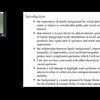examine
Schools and segregation – a positive example
The importance of socio-economic background will become increasingly important for school success. But segregation in the school area is steadily growing and inequality is increasing, a development tha

Filip Olsson
I work as a researcher in sociology at the Institute for Futures Studies. In the fall of 2024, I defended my dissertation, Culture and Implicit Cognitions, at Stockholm University. My dissertation focu
Birth Intervals and Health in Adulthood: A Comparison of Siblings Using Swedish Register Data
Demography, Volume 55, Issue 3, pp 929–955. Abstract A growing body of research has examined whether birth intervals influence perinatal outcomes and child health as well as long-term educational and s

Markus Jäntti: Trends in absolute intergenerational income mobility in Sweden
Markus Jänttis research centers on income inequality, poverty, socio-economic mobility, and wealth inequality, especially in a cross-national perspective. He teaches econometrics and methods for inequ

Martin Kolk
I am a demographer with an interest in all major demographic processes (fertility, mortality, union formation, and migration), often with an intergenerational component. I am also interested in if the

The territory of democracy
The presumption that the jurisdiction of the state extends to the borderes of a certain territory is increasingly being challenged, both by indigenous people within this territory, and by extraterritoriral border control.
Ole F. Norheim: Halving premature death by 2050: ethical issues
Venue: Institute for Futures Studies, Holländargatan 13 in Stockholm or online Research seminar with Ole F. Norheim, Mary B. Saltonstall Professor of Ethics and Population Health at Harvard T.H. Chan Sc
Birth Spacing and Parents’ Physical and Mental Health: An Analysis Using Individual and Sibling Fixed Effects
Demography 61(2): 393–418 Abstract An extensive literature has examined the relationship between birth spacing and subsequent health outcomes for parents, particularly for mothers. However, this researc
Gender, Gender Ideology, and Couples’ Migration Decisions
Journal of Family Issues, doi:10.1177/0192513X14522244. Abstract Couples generally move to accommodate men’s, rather than women’s, career opportunities. Using Swedish panel data including 1,039 married o
The future of employment: How susceptible are jobs to computerisation?
Michael Osborne, Exeter College, Oxford. We examine how susceptible jobs are to computerisation. To assess this, we begin by implementing a novel methodology to estimate the probability of computerisat








